
Arrangement, new Sheephead film, premieres in Kayenta
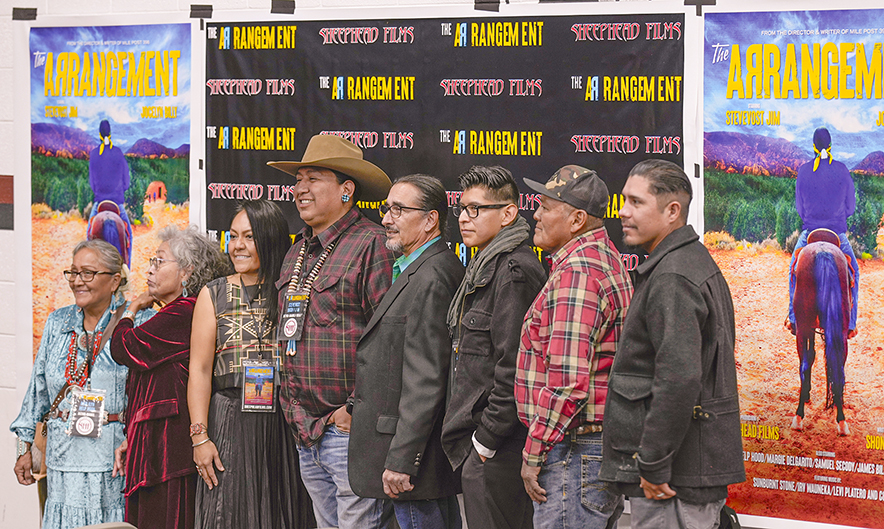
Special to the Times | Donovan Quintero
Arrangement cast and crew members, including director Shonie De La Rosa (fourth from right) and stars of the film, Stevevost Jim (next to De La Rosa) and Jocelyn Billy-Upshaw (third from left), pose for the camera on Saturday evening inside the Jonathan Nez Auditorium at Monument Valley High.
KAYENTA
A Navajo romantic comedy by Shonie De La Rosa, perhaps a groundbreaking film in Navajo cinema, weaves a heartwarming tale of love, humor, and cultural pride. Originally conceived as a short film, “Arrangement” blossomed into a captivating 70-minute feature that showcases the Navajo language and culture in a fresh and endearing way.
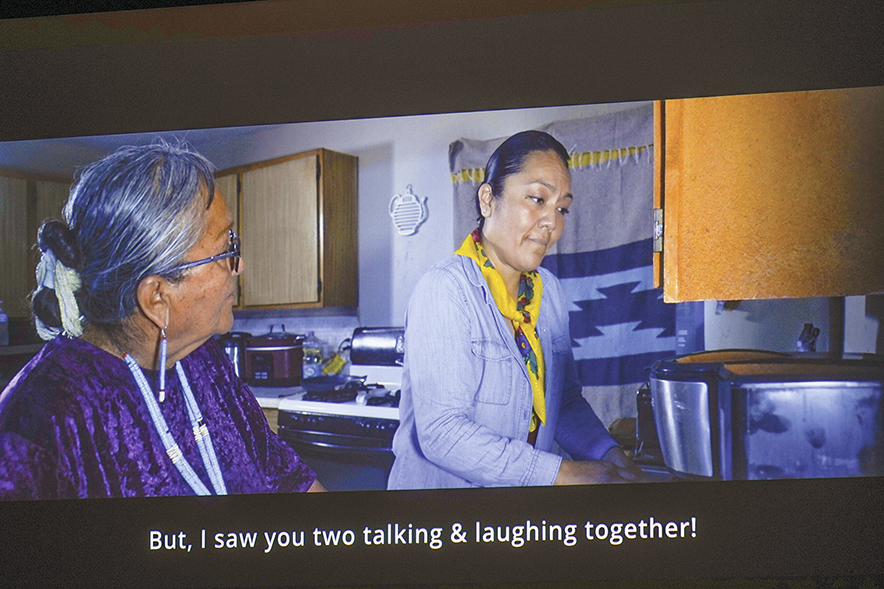
Special to the Times | Donovan Quintero
Jocelyn Billy-Upshaw, right, who plays “Rita,” and Marilyn Help-Hood, who plays her mother, “Mabel,” in Shonie De La Rosa’s new film, Arrangement, premiered in Kayenta on Saturday.
The film stars Stevevost Boshi Jim as Harold Begay, a man who initially resists speaking Navajo and questions its relevance in modern life. His mother, played by Margie Delgarito as Betty Begay, passionately advocates for its importance, setting the stage for the film’s central themes of cultural preservation and self-discovery.
Shonie De La Rosa, the writer, producer, and director, shared the creative journey that brought Arrangement to life. The film premiered Saturday night in Kayenta, marking a major milestone for Navajo cinema. Initially, De La Rosa planned to create an animated film based on a 2010 interview with the late Navajo Code Talker Samuel Holiday.
“I have a complete life story…. It’s like almost a two-hour interview. This is an amazing story,” De La Rosa reflected. The interview detailed Holiday’s life from his childhood to his time as a code talker during World War II. However, the project hit a standstill when the project began experiencing delays.
“I told Cassidy Morgan (with the Navajo Nation Film Office) my situation,” De La Rosa explained. “I really didn’t want to drop out, but I felt it was beyond my control.
“She encouraged me to continue and was given an extension to propose a new concept.”
Community and culture
In a moment of inspiration, De La Rosa turned to his own community and culture.
“I was sitting in my studio thinking, ‘What the hell am I going to make?’ Then it hit me—this story about arranged marriages in Navajo culture,” he shared.
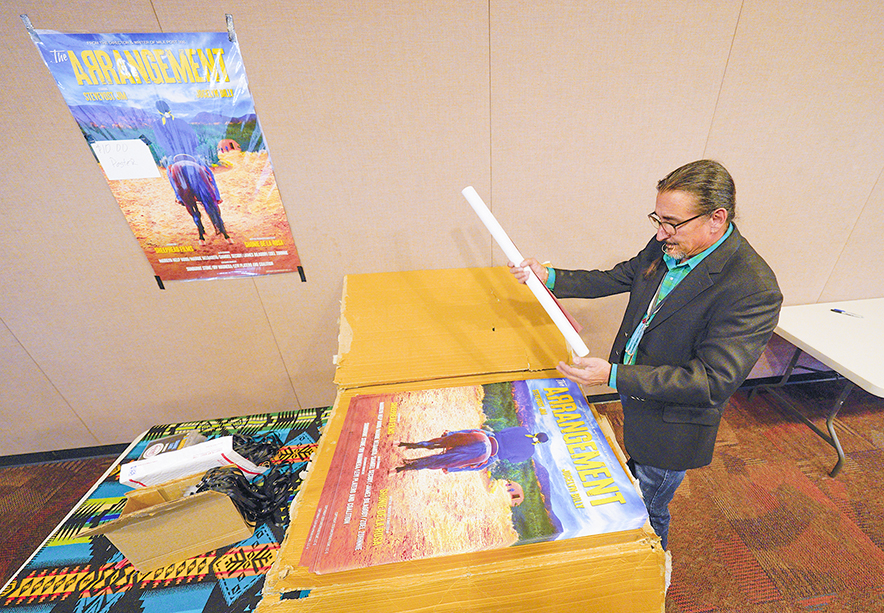
Special to the Times | Donovan Quintero
Arrangement director Shonie De La Rosa, the producer and writer, rolls up a poster during a premier in Kayenta on Saturday.
Recalling conversations with a friend in an arranged marriage, De La Rosa crafted a narrative exploring the experiences of a man and a woman in their 30s navigating family expectations, cultural traditions, and the unique dynamics of an arranged marriage.
“I just jotted it all down … and stayed up all night typing out my proposal. I was so excited—it’s something I’ve never done before,” he said.
As the film evolved from concept to reality, its themes of love, humor, and cultural preservation took center stage.
“I wanted to create something that resonates with the Navajo audience but also touches on universal themes like love, family, and identity,” De La Rosa explained.
Stevevost Jim praised De La Rosa’s vision, particularly his ability to draw out the perfect chemistry between Harold and Rita, played by Jocelyn Billy-Upshaw.
“Shonie picked the perfect Rita,” Jim said. “The way he wrote Harold’s story just clicked—it was so relatable.”
Language, tradition of arranged marriages
Billy-Upshaw, who stars as Rita, shared her experience navigating the film’s cultural and linguistic challenges in a recent interview.
Billy-Upshaw reflected on the intimidation she initially felt in taking on the project, particularly regarding the use of the Navajo language.
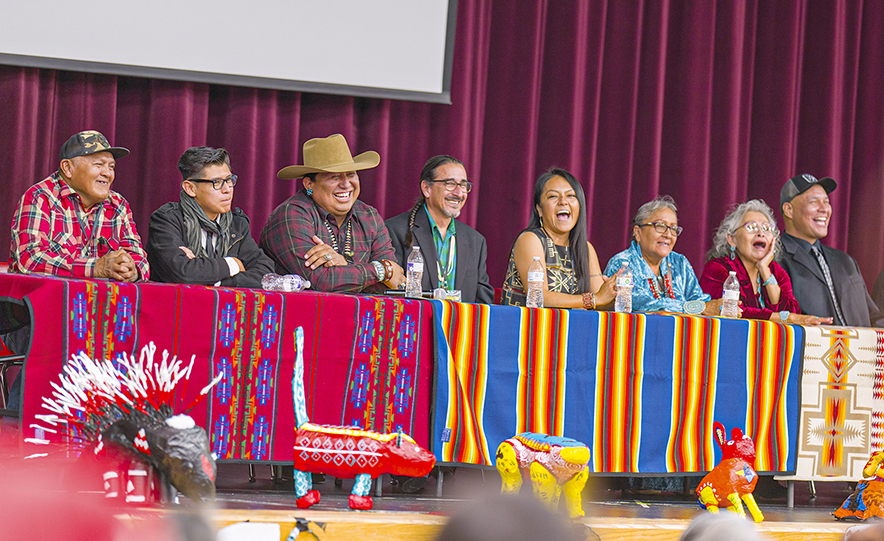
Special to the Times | Donovan Quintero
Arrangement cast and crew members are seated to respond to the audience’s feedback on Saturday in Kayenta. Director Shonie De La Rosa and Jocelyn Billy-Upshaw, who plays “Rita,” are seated in the center.
“Navajo is already complex,” she explained, noting how meaning can shift depending on circumstances such as the landscape—whether one is “in front of the mountain or behind the mountain.”
The film also addresses the tradition of arranged marriages within Navajo communities, a subject Billy-Upshaw described as both “universal” and rarely discussed.
“It’s something Navajo families experienced, whether they were Christian or traditionalist,” she said.
While the story doesn’t center on a Navajo wedding ceremony, it explores themes of relationships and the cultural significance of such arrangements, offering a glimpse into a practice that bridges generations.
Central to the film’s success, Billy-Upshaw emphasized, was the collaborative spirit of the cast and crew. She described a sense of emotional unity during production.
“When someone got hurt, we all got hurt together; when someone was happy, we were all happy,” she said.
Cultural teachings
For Billy-Upshaw, the film became more than just a storytelling project—it was an opportunity to engage with and preserve Navajo traditions. She shared how the film sparked meaningful conversations about cultural teachings, arranged marriages, and ceremonial practices with her daughters.
“We talked about the importance of the Navajo basket in kinaaldá ceremonies, about water, cleansing, and how it connects to what we also believe in the church,” she said.
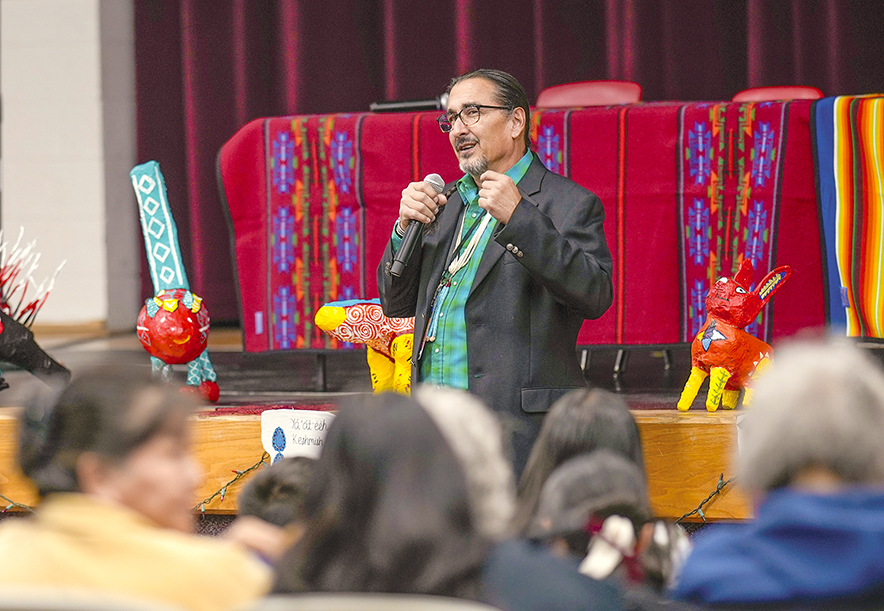
Special to the Times | Donovan Quintero
Arrangement Director Shonie De La Rosa, the producer and writer, speaks about his new film during its debut in Kayenta on Saturday.
Billy-Upshaw hopes that the film will resonate with audiences, encouraging pride in Diné identity and traditions.
“We can still be Diné in this modern day where people say we live in two worlds,” she reflected.
The use of the Navajo language throughout the film is a testament to De La Rosa’s commitment to cultural authenticity.
“The Navajo language is such an important part of our identity,” he said. “Incorporating it into the film wasn’t just about preserving the language but showing how it’s still relevant and powerful today.”
Dela Rosa’s determination to complete Arrangement speaks to his passion for storytelling and his love for his culture. What began as a project rooted in historical storytelling transformed into a poignant exploration of contemporary Navajo life.
“This film is a celebration of who we are,” De La Rosa concluded. “It’s about finding humor in our traditions, embracing our identity, and preserving the things that make us unique. If it inspires even one person to reconnect with their roots or speak Navajo, then we’ve succeeded.”
Engaging with communities
De La Rosa revealed that Diné College has shown interest in hosting the film’s debut, creating an opportunity for collaboration with local educational institutions.
“It’s important for me to engage with our communities, and Diné College is a perfect place to start,” he stated.
He also mentioned reaching out to other cities, including Albuquerque and Phoenix, where various groups have contacted him about potential screenings.
A key aspect of De La Rosa’s plan is his innovative fundraising model, which he hopes to replicate from his previous project, “Milepost 398.”
“Last time, we split ticket sales 50-50 with local organizations, like student councils,” he explained. “It’s essential that when we screen films, the communities that support us also benefit financially.”
De La Rosa emphasized his belief in giving back.
“It wouldn’t feel right to profit solely from the film without supporting the community that helped make it possible,” he said.
His focus on reciprocity illustrates his dedication to fostering a sense of connection between his work and the people it represents.
In addition to local premieres, De La Rosa has taken steps to showcase “Arrangement” at a wider level, submitting the film-to-film festivals, including the prestigious Imaginative Indigenous Festival in Toronto.
“I want to share these Indigenous narratives beyond our borders,” he noted.
Expressing his openness to further engagement, De La Rosa also mentioned plans for additional screenings at schools and community clubs.
“Making films accessible to everyone while ensuring that our communities can benefit from their success is my priority,” he affirmed.
Prepare to be entertained, fall in love, and experience a profound sense of cultural pride in this one-of-a-kind romantic comedy. With its heartfelt story and relatable humor, Arrangement serves as a powerful testament to the transformative power of storytelling in preserving and celebrating Navajo culture.







 Highway 264,
Highway 264, I-40, WB @ Winslow
I-40, WB @ Winslow